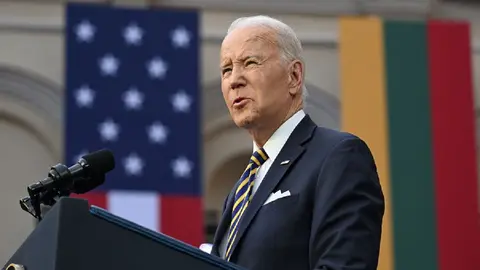The Haley and DeSantis alternative

With just a few days to go before the Iowa primaries set the US presidential election machinery in motion, not many analysts see an option other than Donald Trump winning the Republican nomination for the White House. Nor is it any other option than President Joe Biden running for re-election.
Haley vs. DeSantis
Even so, CNN organised a pre-election debate on Wednesday 10 January in Des Moins between the moderate Republican Nikki Haley, former governor of South Carolina, and the conservative Ron DeSantis, governor of Florida, which former President Trump did not attend, following his strategy of ignoring his party's rivals and campaigning on his own, outside of anything that might sound like the "establishment". And so he did, at a forum organised the same day by the Fox network. While Biden maintains a comfortable electoral distance from Washington, Trump leads the Republican alternative from an unusual pre-election environment: inside the courts and outside democratic institutions.
Polls give Trump a substantial lead in Iowa, but also warn of Haley's strength in the following primaries in New Hampshire and South Carolina. But the sense projected in public opinion after the showdown between the two young and experienced Republican hopefuls is that forecasts based on the past can be reversed by forecasts based on the future. Although Haley and DeSantis were at each other's throats and made their political differences clear, they were able to offer a different image of the Republican Party and now have a few months to project a different image of American democracy, depolarised and institutionally strong. And if they are able to generate a successive change in the climate of opinion of a few thousand Republican pledges, it could be that the change will also affect a significant number of voters who, in addition to winning the elections, imagine a renewed political landscape with less tension.
Nikki Haley represents a moderate liberalism committed to global affairs, which brings her closer to President Biden in her decision to maintain support for the Ukrainians in order to continue defending themselves against Russian aggression. On foreign affairs, he shares DeSantis' support for Israel as a priority ally of the United States, and at the domestic level, the proposal to cut taxes and contain public spending, at a time when Americans are concerned about inflation and the outlook for the economy.
For his part, Ron DeSantis is neither combative in his assessment of Donald Trump's presidency nor in his attack on his political action in the events on Capitol Hill in January 2021. He agrees with Haley in recognising the Democratic victory and focuses on the fight against illegal immigration as another of his electoral arguments, as does his rival. And, in both cases, they criticise Trump's populism in 2020 when he promised a wall, which he never built, to win the support of the voters most sensitive to the issue.
The most decaffeinated primaries in recent years may produce different effects from those predicted by less reliable polls than on other occasions because the 2024 elections have an alternative route to the one that usually begins in Iowa, passes through the February super Tuesday and ends at the summer conventions. Now, the judicial factor and the need to renew the country's institutional and political image may play in favour of a climate of change. Of faces, of messages and trends, and who knows if it could also change the gender and generation in the White House.



